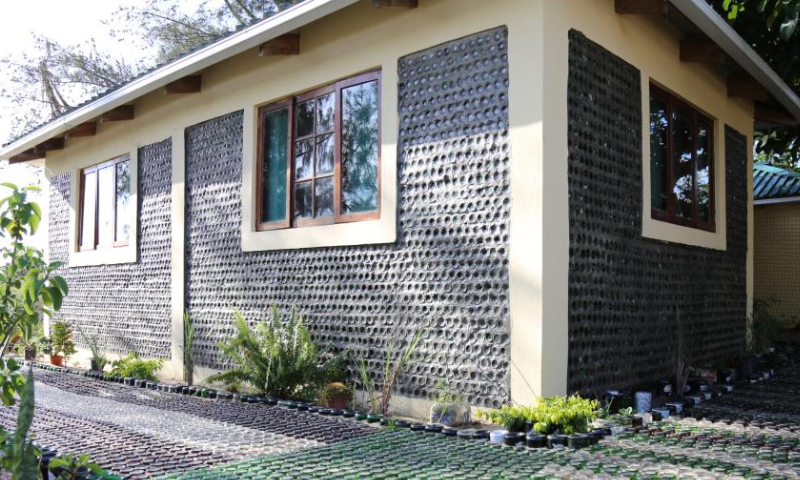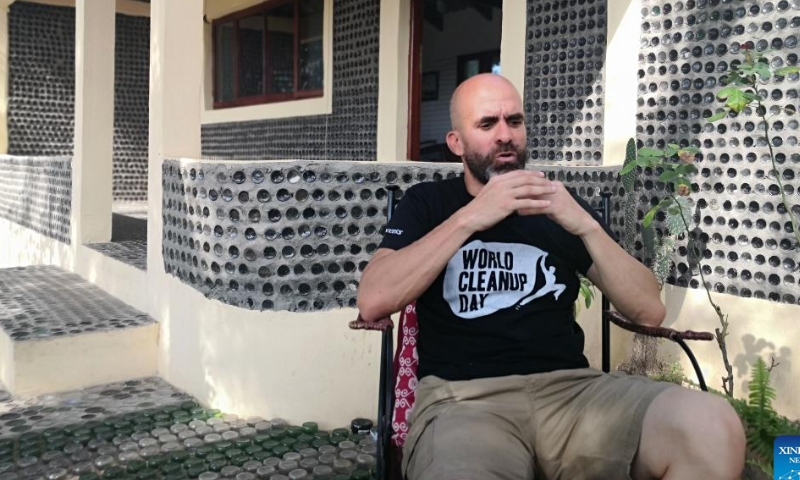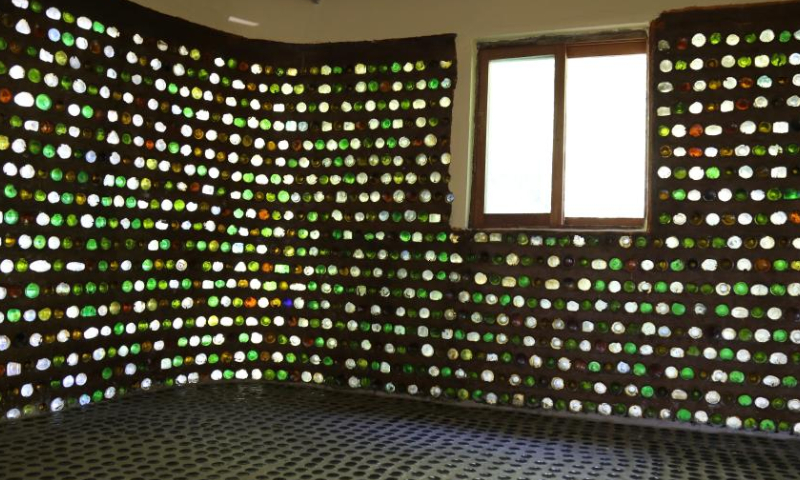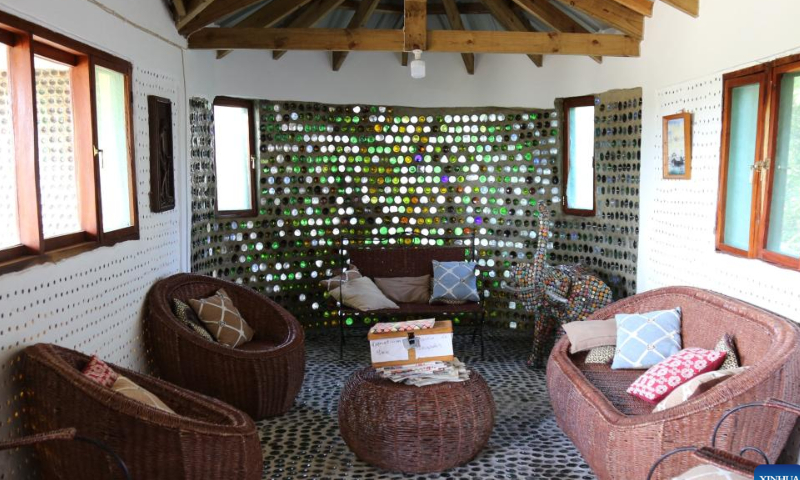
This photo taken on Nov. 5, 2022 shows the exterior of a house built with recycled glass bottles in Macaneta, Mozambique. Macaneta, an underdeveloped beach resort located on the northern outskirts of Mozambique's capital Maputo, may be less known to foreign visitors. However, one new project has recently been added to the resort's few attractions: a house built with recycled glass bottles. Photo: Xinhua

Mozambican environmentalist Carlos Serra shares the story and idea of his glass-bottle house in front of the camera in Macaneta, Mozambique on Nov. 5, 2022. Macaneta, an underdeveloped beach resort located on the northern outskirts of Mozambique's capital Maputo, may be less known to foreign visitors. However, one new project has recently been added to the resort's few attractions: a house built with recycled glass bottles. Photo: Xinhua

This photo taken on Nov. 5, 2022 shows the wall and floor in one outbuilding of a house built with recycled glass bottles in Macaneta, Mozambique. Macaneta, an underdeveloped beach resort located on the northern outskirts of Mozambique's capital Maputo, may be less known to foreign visitors. However, one new project has recently been added to the resort's few attractions: a house built with recycled glass bottles. Photo: Xinhua

This photo taken on Nov. 5, 2022 shows the living room of a house built with recycled glass bottles in Macaneta, Mozambique. Macaneta, an underdeveloped beach resort located on the northern outskirts of Mozambique's capital Maputo, may be less known to foreign visitors. However, one new project has recently been added to the resort's few attractions: a house built with recycled glass bottles. Photo: Xinhua
Macaneta, an underdeveloped beach resort located on the northern outskirts of Mozambique's capital Maputo, may be less known to foreign visitors. However, one new project has recently been added to the resort's few attractions: a house built with recycled glass bottles.
It is where the temperamental Incomati River meets the Indian Ocean. For visitors who come specifically for the house and look at it from a distance, it seems to be unremarkable, blending in with the landscape.
But if you stay closer and look for a while, you may feel a touch of art by the exquisiteness of the structure.
Glass bottles in various colors are horizontally embedded into concrete walls, becoming part of the structure, as well as decorating the entire building.
The floors and passageways of the various spaces of the house are covered with the upside-down bottles, which are carefully hammered deep into the ground.
The house includes a living room, kitchen, bathroom and even two outbuildings that serve as a library and meeting space. If you look closely enough, you'll notice that even the bricks, the basic building units of the house, are made of concrete mixed with tiny shiny pieces of glass.
These could be bottles for whiskey, gin, wine or even olive oil. When staying inside and experiencing the tranquility brought by the dimmed natural light shining through the colorful glass bottles, people can't help but think how wonderful it is to make discarded glass bottles to be so useful again.
In fact, Mozambique's unique geographic location also means that it can be one of the most vulnerable countries on Earth to climate change, which brings a natural sense of crisis and endless sources of inspiration to the local environmentalists when it comes to protecting the environment and promoting harmony between human and nature.
The designer and builder of the house, Mozambican environmentalist Carlos Serra and his team, shared with Xinhua their original ideas behind the house's construction.
As an environmental activist and a professor who once majored in urban planning and environmental law, Serra said he has identified many threats that the country faces in terms of the environmental protection and climate change, and he also noticed the incredible potential that his people have got to deal with these threats.
The idea of building a house with glass bottles is part of an environment education initiative named Repensar, which means "Rethink" in Portuguese. The professor explained that he wants to "deconstruct" the concept of garbage by using the recycled glass bottles as a fantastic construction material.
"Discarded glass bottles can be both a problem and a potential for solution in the environment. As they attract a whole set of pests. A bottle, for example, can be a mosquito breeding ground, and when broken it poses a very high risk for the safety of people, it can cause accidents at public places,"said Serra.
Like Serra said, solid waste can cause tragedies if not handled properly. This has been borne out by the notorious collapse of the Hulene dump in 2018. As an open-air landfill on the outskirts of Maputo, Hulene eventually expanded into a 17-hectare mountain of garbage as the city has been producing more waste than it can process. In Febuary 2018, following a heavy rain, the dump collapsed and killed at least 16 residents.
While using glass as the main material, Serra said his team wanted to remove as many ditched bottles from the environment as possible, who not only searched for bottles at public places themselves but also paid money for what the villagers brought to them. They even built up a small value chain.
"We instilled in people the idea that they can deliver the recycled bottles to us for some cash. Unfortunately, it was not enough for this chain to be fairer, but we paid what was possible to the collectors so that they could have some income," said Serra.
From May 2019 to 2022, Serra's Repensar project has recycled 700 tonnes of glass bottles. He and his team spent 14 months, using up an estimated 200,000 glass bottles including both the intact and ground ones, to build what he calls the "eco-center" of the project.
Serra said he believes they have already achieved the goal of promoting environmental education through the bizarre house, "because just visiting the house helps. As these bottles are of different colors, different patterns, they end up creating a magical effect on anyone who visits us," he said.
"If we run out of bottles, we'll go for another type of solution, see that plastic can also be done a lot with it, but the most important point is to have a drastic reduction in the use of conventional materials like cement and sand, especially because the extraction of these materials in the environment also causes impacts. We are always studying alternatives," said Serra.
